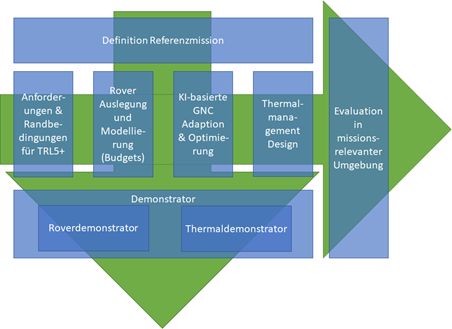SAMLER-KI
Semi-autonomous micro rover for lunar exploration using artificial intelligence

The Moon is the next step for the use of humans and robots to exploit the available resources (water, other volatiles and lunar materials e.g. regolith, metals, rare earths, etc.) for longer-term missions on the Moon, but also for further exploration of the solar system. The challenges for initial and preferably low-cost exploration missions in this regard are that the robots must be as compact and lightweight as possible for transport from the Earth to the Moon, while at the same time performing many different tasks. Depending on the landing site and user requirements, it will also be necessary to adapt the rovers to the mission scenario. Modular structures and components can be advantageous for this and help to react flexibly to mission changes and to reduce costs. In this research project, a reference baseline will be established, which can be used for the design, development and validation of innovative and modular robotic subsystems. As a result, a modular and flexibly applicable microrover will be designed and modeled. In order to extend the possible range of applications, the focus is on the realization of a high degree of autonomy as well as an innovative thermal management for a significantly extended mission.
Project details
The project has the goal to open the potential for future micro rover missions by distinct further development and TRL increase of critical components. For this purpose, in addition to a generalized mission analysis, a realistically applicable microrover will be designed and configured in its core subsystems to serve as a reference model for further subsystem development and TRL increase, e.g., in terms of mass, power, communications budget, etc. Conceptual design and analysis for the technical survival in the cold and long nights will be a focus. Innovations such as the use of Infused Thermal Solutions (ITS) concepts in the structure of the microrover or the modularization and design of a thermally regulated rover garage will be considered in order to find the most flexible, modular and efficient solution for an efficient energy budget.
Another focus is related to the further development and optimization of already existing AI-based robot control and navigation software including mission-relevant sensor and processor architectures. Mission parameters, such as mission duration, landing site, and specific lunar surface activities such as traversing shadowed areas or entering a crater, will strongly influence the rover's system design. Requirements and adaptations to the hardware, sensors for navigation and control and telemetry, as well as AI-driven software for e.g. a break of the radio link by interrupting the line of sight will be brought together and investigated in this project. A particular challenge is the adaptation of the computationally demanding AI algorithms to the respective on-board processing capabilities. In addition, the ability to operate at different levels of autonomy and to easily switch between them will be investigated and implemented. This is particularly necessary in terms of optimal resource utilization and, on the other hand, enables a significant increase in efficiency and system capabilities by applying AI-driven autonomous operations. The developments provide technical solutions for lunar rover components to operate in extreme environmental requirements (such as permanent shadow or the lunar night) and enable the system to meet challenging mission objectives with limited immediate access by applying AI methods semi-autonomously.
Videos
SAMLER-KI: Surviving Lunar Nights - AI-Powered Micro Rover for Future Moon Missions

Robotic systems will play a key role in future lunar missions, and a great deal of research is currently being conducted in this area. The SAMLER-AI project is also conducting research in this area.. The project focuses on the conceptual design of a semi-autonomous micro rover that is capable of surviving lunar nights while remaining within the size class of a micro rover. During development, conditions on the Moon such as dust exposure, radiation, and the vacuum of space are taken into account, along with the 14-Earth-day duration of a lunar night.
For a reference mission, the surroundings of the Reiner Gamma region were selected. This example mission is planned to start on 16 March 2030 at 21:00:00 Barycentric Dynamical Time (TDB) and will last for two lunar days, concluding on 27 April 2030 at 13:00:00 TDB. The highlight of the mission will be the rover surviving the lunar night, allowing it to continue its journey into the second lunar day.
The animation shows the approach developed so far by DFKI and FH Aachen.


![[Translate to English:] Rechnerarchitektur](/fileadmin/content/ric/research/projects/space/sammler-ki/Rechnerarchitektur.jpg)